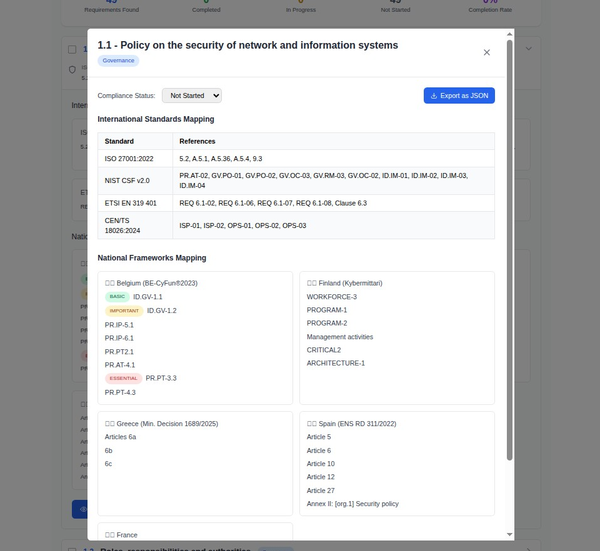Guide to Cybersecurity Initiatives in Africa

Introduction
Africa is experiencing rapid digital transformation, which brings both opportunities and challenges. As digital adoption increases, so does the risk of cyber threats. To address these challenges, various cybersecurity initiatives have been undertaken across the continent. This guide provides an overview of key cybersecurity initiatives, policies, and frameworks within Africa, highlighting efforts by governments, regional organizations, and international collaborations.
@cisomarketplace Protecting Nigeria's National Security: The Role of Cyber Warfare | Nigerian Army Cyber Warfare School Join us in this informative workshop organized by the Nigerian Army Cyber Warfare School to explore the integration of cyber security into military operations. Learn about the tactics and strategies to counter cyber threats, including foreign governments and criminal organizations. Enhance your knowledge and become a skilled cyber warrior. #CyberWarfare #NationalSecurity #NigerianArmy #CyberSecurity #MilitaryOperations #CyberThreats #CyberWarriors #InformationSecurity #Nigeria #CyberAttack
♬ original sound - CISOMarketplace

Key Cybersecurity Initiatives
- African Union (AU) Cybersecurity Frameworks
Overview: The African Union has been proactive in developing continent-wide cybersecurity strategies. The most notable initiative is the AU Convention on Cyber Security and Personal Data Protection, also known as the Malabo Convention.Malabo Convention:
- Adopted: June 27, 2014
- Objective: To establish a legal framework for cybersecurity and data protection in Africa.
- Key Provisions:
- Protection of personal data.
- Promotion of cybersecurity and combating cybercrime.
- Establishment of national cybersecurity and data protection authorities.
- Status: As of now, several countries have signed and ratified the convention, but wider adoption is ongoing.
- National Cybersecurity Policies
Overview: Many African countries have developed national cybersecurity policies to protect their digital infrastructure and combat cybercrime.Examples:
- South Africa: National Cybersecurity Policy Framework (NCPF), which outlines the country’s strategy for cybersecurity.
- Nigeria: National Cybersecurity Policy and Strategy (NCPS), focusing on safeguarding the nation's cyberspace.
- Kenya: Computer Misuse and Cybercrimes Act (2018), addressing cybercrime prevention and response.
- Ghana: Data Protection Act (2012), ensuring data privacy and security.
Regional Collaborations
Economic Community of West African States (ECOWAS):East African Community (EAC):
- ECOWAS Cybersecurity Agenda: Aims to harmonize cybersecurity policies and strengthen cooperation among member states.
- Key Initiatives:
- ECOWAS Cybersecurity Strategy.
- Capacity building and training programs.
- Information sharing and incident response mechanisms.
- EAC Framework for Cyberlaws:
- Focuses on harmonizing cyber laws across member states.
- Promotes the adoption of common cybersecurity standards.
- Capacity Building and Training Programs
Overview: Capacity building is crucial for developing skilled cybersecurity professionals in Africa. Various initiatives focus on training, awareness, and skill development.Examples:
- Africa Cybersecurity and Digital Forensics Conference (ACDFC): An annual conference aimed at enhancing cybersecurity awareness and skills.
- African Cybersecurity Resource Centre (ACRC): Provides training and resources for cybersecurity professionals.
- Cyber4Dev: An EU-funded initiative that offers cybersecurity training and support to African countries.
- Public-Private Partnerships (PPP)Overview: Collaboration between the public and private sectors is essential for effective cybersecurity. Various initiatives foster such partnerships to enhance security measures.Examples:
- Ghana Cyber Security Authority (CSA): Works with private companies to improve cybersecurity practices.
- Nigeria Communications Commission (NCC): Engages with telecom operators to ensure network security.
- South Africa's Cybersecurity Hub: Facilitates collaboration between government, industry, and academia.
- Cyber Incident Response Teams (CIRTs)Overview: Establishing national CIRTs is vital for coordinated responses to cyber incidents. Many African countries have set up CIRTs to handle cybersecurity threats.Examples:
- Kenya: National Kenya Computer Incident Response Team – Coordination Centre (KE-CIRT/CC).
- South Africa: National Computer Security Incident Response Team (CSIRT).
- Nigeria: Computer Emergency Response Team (ngCERT).
Challenges and Opportunities
- Challenges:
- Limited Resources: Many countries face financial and technical resource constraints.
- Skill Shortages: There is a significant shortage of skilled cybersecurity professionals.
- Regulatory Gaps: Inconsistent adoption and enforcement of cybersecurity laws and policies.
- Opportunities:
- Regional Cooperation: Strengthening regional collaborations can enhance collective cybersecurity.
- International Support: Leveraging international partnerships and aid can improve cybersecurity infrastructure.
- Education and Training: Investing in education and training programs to build a robust cybersecurity workforce.
Conclusion
Africa's cybersecurity landscape is evolving rapidly, with various initiatives aimed at enhancing digital security. By adopting comprehensive policies, fostering regional cooperation, and investing in capacity building, African nations can better protect their digital infrastructure and combat cyber threats. For more detailed information on cybersecurity initiatives and best practices, visit ComplianceHub Wiki.
Additional Resources
- African Union Commission on Cybersecurity
- ECOWAS Cybersecurity Agenda
- Cyber4Dev Initiative
- Africa Cybersecurity and Digital Forensics Conference
By leveraging these resources and continuously improving security measures, African nations can stay resilient against evolving cyber threats and ensure a secure digital future.






